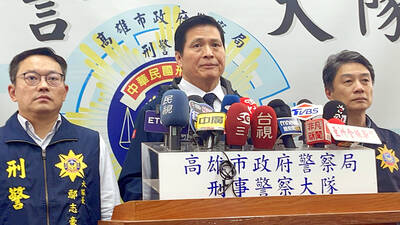The Chinese Communist Party (CCP) is stepping up efforts to sow discord in Taiwan by conducting military exercises and inciting distrust of the US, the National Security Bureau (NSB) said in a report to the legislature on Tuesday.
NSB Director-General Tsai Ming-yen (蔡明彥) and Overseas Community Affairs Council Minister Hsu Chia-ching (徐佳青) were asked to brief the legislature’s Foreign Affairs and National Defense Committee on Wednesday on how the CCP’s “composite threat” affects Taiwan’s national security.
China has launched military exercises in an attempt to create the impression that Taiwan was on the brink of war after then-US House of Representatives speaker Nancy Pelosi visited Taipei in August last year and after President Tsai Ing-wen (蔡英文) stopped over in the US this month, the bureau said.
Beijing has also hyped up issues such as Taiwan Semiconductor Manufacturing Co (TSMC) establishing production facilities in Arizona, claimed that US carriers were “running away” from the newest Chinese aircraft carrier, the Shandong, and propagated reports saying that “the US is abandoning Taiwan” in an attempt to shake the nation’s faith in the US.
Beijing is stepping up hacking efforts that attack crucial Taiwanese facilities and using the Internet to engage in cognitive warfare, the bureau said.
Beijing is also processing hacked data for redistribution or selling it on the dark net to attract media attention and, through repeated reporting on such attacks, shake the public’s faith in the government, it said.
Beijing is also attempting to sow discord by promising Taiwanese “benefits” for interacting with China, it said.
Beijing is blaming Taiwan for the deterioration of cross-strait relations, while launching an investigation into Taiwan’s trade policies, which it is expected to extend until next year’s presidential election to sway public opinion, the bureau said.

Twenty-four Republican members of the US House of Representatives yesterday introduced a concurrent resolution calling on the US government to abolish the “one China” policy and restore formal diplomatic relations with Taiwan. Led by US representatives Tom Tiffany and Scott Perry, the resolution calls for not only re-establishing formal relations, but also urges the US Trade Representative to negotiate a free-trade agreement (FTA) with Taiwan and for US officials to advocate for Taiwan’s full membership in the UN and other international organizations. In a news release announcing the resolution, Tiffany, who represents a Wisconsin district, called the “one China” policy “outdated, counterproductive

ON PAROLE: The 73-year-old suspect has a criminal record of rape committed when he was serving in the military, as well as robbery and theft, police said The Kaohsiung District Court yesterday approved the detention of a 73-year-old man for allegedly murdering three women. The suspect, surnamed Chang (張), was arrested on Wednesday evening in connection with the death of a 71-year-old woman surnamed Chao (趙). The Kaohsiung City Police Department yesterday also unveiled the identities of two other possible victims in the serial killing case, a 75-year-old woman surnamed Huang (黃), the suspect’s sister-in-law, and a 75-year-old woman surnamed Chang (張), who is not related to the suspect. The case came to light when Chao disappeared after taking the suspect back to his residence on Sunday. Police, upon reviewing CCTV

Johanne Liou (劉喬安), a Taiwanese woman who shot to unwanted fame during the Sunflower movement protests in 2014, was arrested in Boston last month amid US President Donald Trump’s crackdown on illegal immigrants, the Criminal Investigation Bureau (CIB) said yesterday. The arrest of Liou was first made public on the official Web site of US Immigration and Customs Enforcement (ICE) on Tuesday. ICE said Liou was apprehended for overstaying her visa. The Boston Field Office’s Enforcement and Removal Operations (ERO) had arrested Liou, a “fugitive, criminal alien wanted for embezzlement, fraud and drug crimes in Taiwan,” ICE said. Liou was taken into custody

TRUMP ERA: The change has sparked speculation on whether it was related to the new US president’s plan to dismiss more than 1,000 Joe Biden-era appointees The US government has declined to comment on a post that indicated the departure of Laura Rosenberger as chair of the American Institute in Taiwan (AIT). Neither the US Department of State nor the AIT has responded to the Central News Agency’s questions on the matter, after Rosenberger was listed as a former chair on the AIT’s official Web site, with her tenure marked as 2023 to this year. US officials have said previously that they usually do not comment on personnel changes within the government. Rosenberger was appointed head of the AIT in 2023, during the administration of former US president Joe